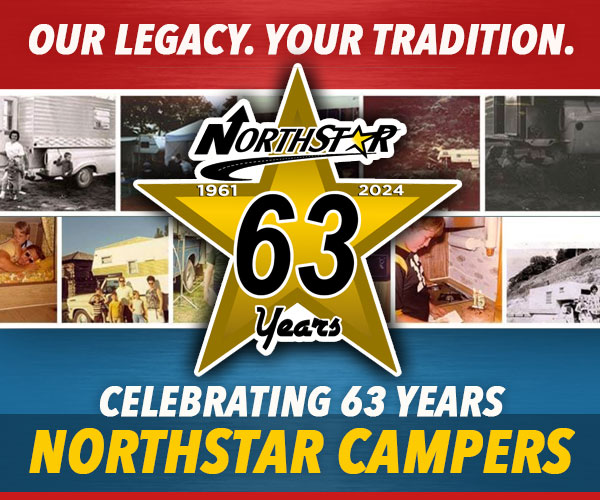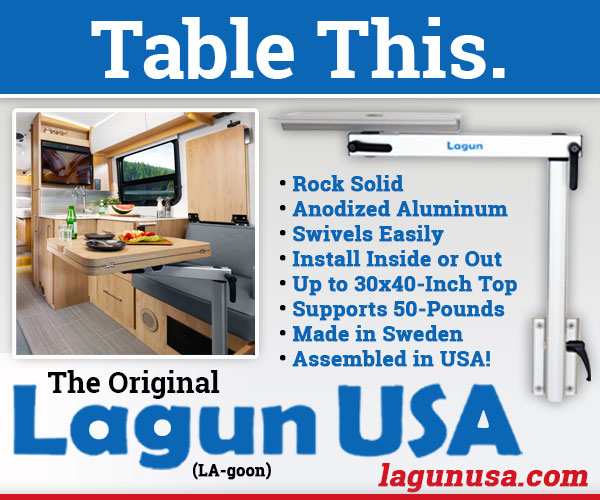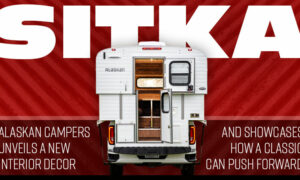Last week’s Question of the Week was, “What tips and tricks have you learned about winterizing and de-winterizing your truck and camper?” Readers share their winterizing tips and tricks.
“Watch the weather and, if it looks like it is going to get close to freezing, beat it to the jump and winterize before you have damaged pipes. If we haven’t winterized first, the other trick my wife and I use is to turn the furnace on overnight. Now we have a Northern Lite and that has heated tanks. If you are going to do that, make sure you have enough propane to get you through until the temperature goes up the next morning.” – Al Stebbins
“Living in the cold part of Canada, we are stuck with the awful feeling of finding out that we missed a spot of plumbing when winterizing and that a covered section of pipe busted! The closed up smell that welcomes us each spring, goes away after a few hours of opening the windows for fresh air. But the souvenirs of past adventures quickly bring us back to the excitement of a future trip and makes us slowly forget the long winters!” – Denise Hupé
“I never liked using RV antifreeze (the pink stuff). It was always such a pain to de-winterize. Living in Albuquerque, New Mexico, we tend to have mild winters, which allow us to take winter trips. That means winterizing and de-winterizing several times each winter. My preferred method is to first drain the hot water heater, the fresh water tank, and the hot and cold water lines. Next I blow out all the lines (don’t forget the toilet and outside shower) with an air compressor through the city water intake line using a fitting available at Camping World (or you can make your own). The last step is to put RV antifreeze in the kitchen and bathroom p-traps and a gallon in the black water holding tank. De-winterizing is a snap. Just fill and sanitize the fresh water tank and go. I have followed this procedure for forty years and have never had a broken pipe, or a broken water pump, water heater, faucet, or toilet.” – Steve Urist
“Being a smart aleck, I would suggest living in Arizona as I do. It’s the easiest winterizing ever!” – Bonnie Belza
“Early on I made the classic mistake of not separating the fresh water tank from the system when winterizing. I couldn’t understand why it was taking so much pink stuff? Boy did it take a lot of flushing to get rid of that taste come spring time. I have winterized so many campers now, it is a quick task, and not nearly as complicated as it sounds. Mouse proofing may be a better term than winterizing! Can we have Harley come stay with us for a week?” – Bill Tex
“After forty plus years of messing with campers, the winterizing process I use seems to work every time. Here in northern Minnesota it gets down below zero degrees Fahrenheit for extended periods, so winterizing is important. Drain the water tank and the hot water heater preferably on a hill to empty well. Then, blow out the lines, pump RV antifreeze through every fixture including the exterior shower, blow out the RV antifreeze, and pour antifreeze into all of the traps. Then, remove all liquids, food and supplies from the camper, prop the refrigerator door open, strip the bed, and plan the next trip. We do not have issues with rodents with our Bigfoot camper due to the fiberglass body. I have found that the electronic pest devices placed on the ground in my storage building and across the sliding door opening have really worked. I’ve had one mouse in two years in the trap.
In the Spring, we flush out the lines with fresh water, add three ounces of bleach, fill up the tank, and pump the bleach mixture through the lines as the tank is filling. Then I take the camper around the block to slosh around the mixture in the tank, let it sit for a couple of hours, drain the tank, fill it again, and pump water through the lines again. Then I let it sit a couple of hours, drain, fill the tank again, and go camping. We drink the water from the tank all summer. In fact, when we go South, we treasure the great tasting Lake Superior water in the tank and only use it for drinking. Happy camping!” – Bigfoot Dave Miller
“ We lived in Iowa when we bought our truck camper, and had to winterize each year. Our tip/trick was to move to California, which completely eliminated the process.” – Mitch Lindquist
“Just a heads-up; truck batteries get a lot more use than batteries in other vehicles and tend to wear out quicker. I purchased my 2003 Ford Super Duty diesel about eighteen months ago and was constantly having to recharge the batteries if I let it sit for more than two weeks. This time started to decrease until it was down to less than one week. Finally I’d had enough and, $400 later, I had two brand new Optima Red Tops in the truck. Now the starter acts like it will tear the engine out of the truck if it dares not to start in the first turn. Still, truck batteries will drain over time and this is made worse if you have a performance tuner, which I do. Now, if I’m going to leave the truck sitting for a while, I unhook the tuner from the OBD-II port and plug in a battery manager that I got from Griot’s Garage. Problem solved. Incidentally, for all you car nuts out there, beware that you could spend your life savings at Griot’s quite easily; the place is incredible.” – Steve Timmings
“Ah. That’s a very simple question. I would get in the rig and drive south, very south, and return in the summer.” – Phil Kaufman
“I have found that if you can keep the snow, ice, rain and leaves off the top of the camper you will have a much easier time cleaning the top in the spring. We purchased a cover for the camper this past fall and it worked just fine. To clean the water heater, I purchased a plastic nozzle that can be inserted into the drain to remove any sediment. I do this in the fall and the spring. I put the battery on a trickle charger in the garage to maintain it throughout the winter. It is more exciting to take the camper out of storage then putting it into storage. I really enjoy taking the camper out and take my time to savor the moment!” – Keith Rivers
























